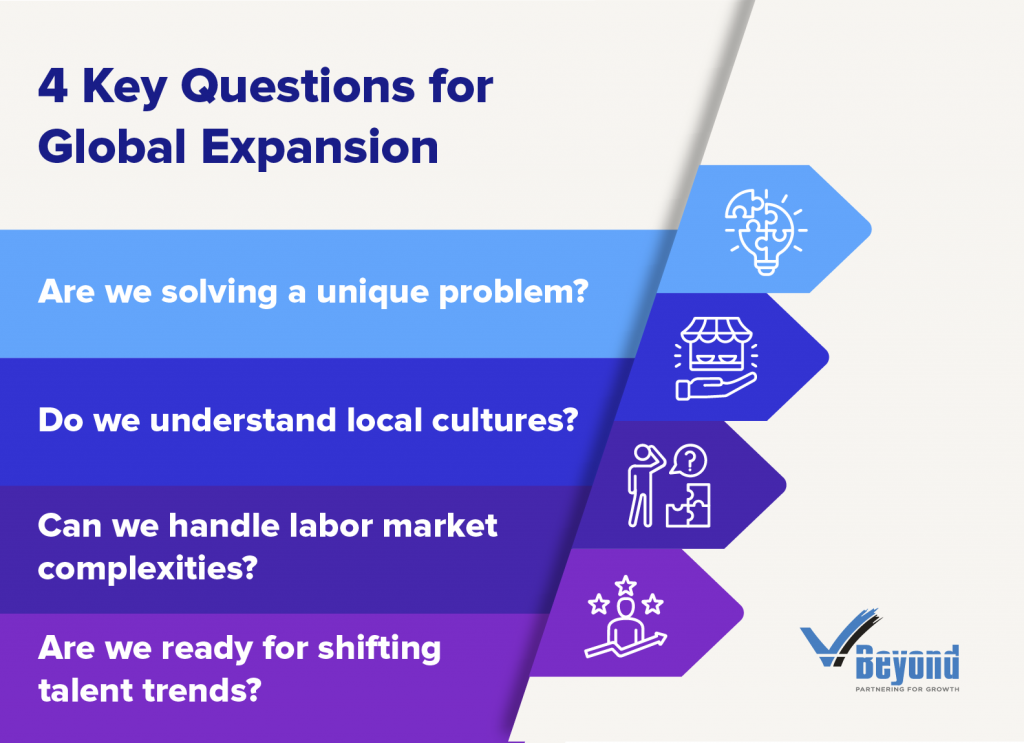Introduction
As we enter a new year, growth is not a given—it is a choice. For staffing and recruitment companies eyeing global markets, expansion has become a reflex: a measure of ambition, a sign of progress. But global growth is unforgiving. The companies that succeed are those willing to question themselves before the market does.
The opportunity is clear. Talent shortages persist. Businesses want global solutions, and the need for workforce agility continues to grow. Yet, the failure rate of global expansion remains staggering. Why? Because too many companies chase new markets with outdated thinking. They assume their success at home is enough to win abroad. They enter regions they don’t understand. They act as if scale alone will shield them from failure.
The result? Expansion that stretches companies thin, erodes margins, and undermines trust.
Global expansion is more than planting flags. It is about knowing, with conviction, that your business can thrive in unfamiliar territory. That requires relentless self-interrogation.
Over the years, I’ve seen staffing firms make the same mistakes: they confuse momentum for strategy, presence for impact, and optimism for readiness. To avoid these pitfalls, leaders must ask the questions that cut through assumptions and force clarity.
The Four Questions That Will Decide Your Global Success in Staffing and Recruitment
Global expansion tests your strategy, your adaptability, and your understanding of markets that don’t play by familiar rules. The following four questions strip away assumptions and expose the realities of whether a staffing and recruitment company is ready to thrive, not just survive, on a global stage.
1. Are We Expanding to Solve a Unique Problem, or Will We Become Just Another Player?
Global expansion often fails not because companies lack ambition, but because they lack a reason to exist in the markets they enter. Over the last year, we’ve seen firms rush into new territories, believing their success at home would carry them forward. But markets don’t reward familiarity; they reward relevance.
Take, for example, a global staffing company that entered Southeast Asia last year with its standard playbook—mid-level talent placements across IT and professional services. The problem? The market was already saturated with hyper-local agencies that knew the cultural nuances, had long-standing client relationships, and understood the real gaps: high-demand trades, renewable energy roles, and niche upskilling solutions. The result? The company added capacity but not value, blending into the noise and leaving frustrated clients who had seen it all before.
This year, global success will belong to those who solve unique, undeniable problems—problems that competitors haven’t even noticed. If you’re expanding into Eastern Europe, are you addressing the STEM brain drain by helping upskill engineers before they leave for global tech hubs? If you’re targeting the Middle East, are you building solutions to supply talent for massive infrastructure projects tied to national economic reforms?
Here’s the hard truth: If your value proposition isn’t tailored to a specific need in that market, you’re not expanding—you’re diluting.
Now ask yourself: If you removed your company’s logo from your offering, would clients still recognize it? If the answer is no, then your business isn’t solving anything unique—it’s simply competing for attention.
Let’s imagine a success story: A staffing firm that entered Latin America, not with a cookie-cutter approach, but with a laser-sharp solution to help global companies access bilingual remote talent—bridging the communication gap for cross-border teams. The firm didn’t compete on volume; it competed on clarity. It understood that companies were struggling to hire flexible talent fluent in both English and Portuguese/Spanish. That’s a problem worth solving.
The lesson is simple: markets don’t need more players—they need problem solvers. Before stepping into new territory, ask:
- What is the one pain point in this market that no one else is addressing?
- Do we have a clear edge that makes us not just present but indispensable?
The companies that thrive globally this year will be those that stop expanding just to “be there” and start expanding because their absence would leave a gap no one else can fill.
2. Do We Have the Cultural Intelligence to Lead and Win in New Markets?
Global expansion doesn’t fail because of systems or processes—it fails because of people. Specifically, it fails because companies underestimate how people think, act, and build trust in markets that don’t mirror their own. The mechanics of setting up a new office, tackling local labor laws, or executing a hiring strategy are challenging but manageable. What’s harder—what most leaders overlook—is developing the cultural fluency to win trust and deliver results where relationships define success.
Hindsight makes this painfully clear. Over the last year, staffing firms rushed into markets like Asia-Pacific, Middle East, or parts of Eastern Europe with solutions that seemed flawless on paper but were tone-deaf in execution. A US-based staffing firm expanding into Japan learned this the hard way. The company applied its fast-paced, results-driven interview model—designed to identify talent quickly—only to discover it alienated top-tier candidates. Why? Because in Japan, decision-making is consensus-driven, and hiring processes are far more deliberate. To local candidates, the company’s approach felt disrespectful and out of sync with expectations. Their “efficiency” became arrogance, and the market rejected them.
The same lessons apply everywhere, in different ways. Middle Eastern markets require relationship-first business cultures, where trust is built through face time, shared connections, and patience. By contrast, Scandinavian candidates may value transparency, equality, and brevity over formalities. In Latin America, employers often build loyalty through community-driven connections, while in the US, the emphasis on individual achievement dominates recruitment messaging.
The question is this: Can your leadership adapt fast enough to address these differences, or will cultural blindness cost you market relevance?
Here’s the twist no one’s asking: Cultural intelligence is not a “nice-to-have” soft skill, but it is the hidden infrastructure of global success. Do your teams know how trust is built in Japan? How power is communicated in Germany? How ambition is expressed in India?
Let’s take a hypothetical success story. A European staffing firm entering the Middle East recognized early that local relationships would make or break their entry. Instead of leading with pitch decks, they hired regional experts—leaders who spoke the language (literally and figuratively) and spent months building credibility with decision-makers before closing their first deal. The result? A trusted partnership pipeline that outpaced competitors by six months.
Contrast that with another staffing company expanding into India. Instead of understanding the local demand for purpose-driven careers and upskilling opportunities, they applied a one-size-fits-all Western employer branding approach. Their messages fell flat. Candidates didn’t feel seen, and the firm struggled to attract top talent.
Cultural intelligence demands that leaders ask uncomfortable but necessary questions:
- Do we know how trust is earned in this market, not just how business is done?
- Are our interview and onboarding practices culturally appropriate, or are they unintentionally off-putting?
- Are we training our leadership teams to recognize local power dynamics, decision-making norms, and communication styles?
Cultural fluency is invisible until you get it wrong. When you do, it’s all anyone notices. Winning global markets requires a deep understanding of what makes each market tick, what builds trust, and what earns you the right to lead.
3. Are We Ready to Address the Hidden Complexities of the Global Labor Market?
Expanding into global markets—whether it’s the US, Latin America, or Southeast Asia—entails managing the unseen complexities that can undermine even the most well-prepared strategies.
Most recruiting companies entering a new market focus on surface-level factors: sourcing talent, identifying demand, and understanding cultural nuances. But too often, they underestimate the hidden hurdles: complex labor laws, fragmented gig economies, partner management risks, and compliance blind spots.
The reality? No two markets play by the same rules.
In the US, staffing companies must contend with multi-layered regulations—federal, state, and local—governing worker classification, wage laws, and client relationships. Missteps can lead to financial and reputational damage. Meanwhile, in emerging markets like Southeast Asia or Latin America, the challenges look different but are equally nuanced:
- Fragmented Workforces: Informal labor markets dominate many industries, requiring staffing firms to build systems that balance efficiency and compliance.
- Partner Management Risks: Local partnerships are critical to accessing talent pools, but weak governance or misaligned incentives can lead to operational disruption.
- Regulatory Volatility: In fast-changing economies, staffing laws and taxation frameworks shift quickly, creating a risk of non-compliance.
For example, consider a staffing firm expanding into an Asian market to support a growing e-commerce boom. While they successfully source workers, they fail to factor in the informal gig networks underpinning the logistics sector. Partnering with unverified intermediaries leads to compliance failures, worker disputes, and disrupted operations.
Contrast this with another firm that anticipates these workforce challenges. They:
- Conduct thorough risk assessments to map hidden workforce dynamics.
- Build local partnerships with trusted, verified providers to ensure transparency and compliance.
- Offer solutions that help clients govern hybrid workforces, integrating gig talent, contractors, and full-time employees seamlessly.
The difference is in the ability to see beyond the obvious and manage the complexities that most firms overlook.
Here are the critical questions staffing leaders must ask before entering any new market:
- Do we fully understand the regulatory landscape and labor laws—not just at a national level, but locally, where the real risks often lie?
- Are we prepared to manage and verify partnerships that enable scale without compromising compliance or transparency?
- Can we anticipate and address the unique workforce challenges—whether formal or informal—that define each market?
Global expansion is about building resilient systems to handle hidden complexities. The companies that thrive won’t be those that enter a market first, but those that enter it prepared—ready to adapt, govern, and lead.
Because the greatest opportunities in global markets are rarely where everyone is looking. They’re in the gaps, the risks, and the spaces that only the most forward-thinking firms are equipped to manage.
4. What Happens If the Global Talent Shortage Ends Tomorrow?
For years, staffing companies have anchored their global strategies on one assumption: talent scarcity equals demand. This has been the bedrock of growth. But today, where markets shift overnight, talent dynamics are no longer predictable.
Look at the contradictions playing out globally. In tech alone:
- More than 225,000 workers were laid off in 2024, with nearly 1,000 layoffs a day, creating sudden surpluses of talent in areas once thought untouchable.
- Yet at the same time, AI-related roles saw explosive demand, increasing 30-fold in a single year.
The forecasts for 2025 and beyond only deepen the volatility. US tech jobs are expected to grow at twice the rate of the overall workforce, while global skills shortages will still cost companies an estimated $5.5 trillion by 2026. (source: 2025 tech job market statistics and outlook.)
What does this tell us? Scarcity is not guaranteed. Instead, global markets are becoming increasingly unstable, driven by layoffs, upskilling, automation, and shifting priorities. Talent shortages can vanish as fast as they appear, leaving companies with one question: Are we building resilience, or are we just reacting to volatility?
Here’s what this means for staffing firms expanding globally:
- Abundance Doesn’t Equal Relevance: Entering a market expecting scarcity only to find talent surpluses—whether from layoffs, government reskilling programs, or automation—can turn your offering into noise.
- Strategic Resilience Is the Edge: The firms that thrive are those that will help clients adapt to market swings through reskilling solutions, talent redeployment, and future workforce advisory.
Take the tech industry as an example:
- A staffing firm expanding into Brazil may expect AI engineer shortages but find government-backed reskilling initiatives flooding the market with AWS-trained workers.
- Another firm, instead of competing on volume, positions itself as a strategic upskilling partner, helping clients prepare teams for the next wave of skills—like generative AI oversight or automation integration.
The difference? One firm reacts to market disruptions; the other anticipates and shapes them.
Global markets are no longer static. Talent gaps will appear, close, and re-emerge in unexpected ways. If staffing companies want to remain valuable, they must move beyond traditional talent sourcing and become architects of workforce resilience.
Ask yourself:
- If talent became abundant tomorrow, would you still have a role to play?
- Are you helping clients future-proof their workforce strategy in a world where disruptions are the new normal?
- Can you deliver solutions—reskilling programs, agile redeployment, and workforce advisory—that make your clients stronger no matter what happens next?

Conclusion
Global expansion is not for the unprepared. It rewards those who bring more than ambition—those who bring clarity, adaptability, and a willingness to interrogate their own assumptions before stepping into unfamiliar territory. The questions you ask today will decide whether your business becomes indispensable tomorrow. Because the markets you enter will not bend to your strengths—they will test your weaknesses. Success will belong to those global recruiting firms who see beyond momentum, who solve problems others overlook, and who are bold enough to challenge what they think they already know.
Ready to expand your staffing business globally? Partner with us to navigate complexities, adapt to new markets, and achieve sustainable growth with confidence.
FAQs
1. What is global expansion for staffing companies?
Global expansion involves entering new markets to provide staffing and recruitment solutions tailored to regional workforce needs and challenges.
2. Why do staffing companies face challenges in global markets?
Challenges often arise due to cultural differences, complex labor laws, fragmented workforce dynamics, and a lack of localized strategies.
3. How can staffing companies address global talent shortages?
By offering reskilling programs, building agile hiring strategies, and targeting niche talent pools to address specific market needs.
4. What role does cultural intelligence play in global staffing success?
Cultural intelligence ensures companies can adapt their strategies to local norms, build trust with clients and candidates, and navigate cultural differences effectively.
5. How can staffing companies prepare for global labor market complexities?
Preparation includes conducting compliance checks, partnering with trusted local agencies, and anticipating unique workforce dynamics like gig economies or informal sectors.
6. What is the importance of hiring strategy in global expansion?
A well-thought-out hiring strategy aligns with local workforce expectations, regulatory requirements, and industry-specific challenges.
7. How can staffing firms future-proof their recruitment processes?
By leveraging technology, offering advisory services, and providing solutions like workforce resilience planning to adapt to market volatility.
8. What are the risks of entering new labor markets?
Risks include non-compliance with local regulations, mismanagement of partnerships, and cultural misalignment leading to operational challenges.
9. What differentiates successful global staffing companies from competitors?
Companies that solve unique local problems, offer tailored services, and anticipate workforce trends stand out in competitive global markets.
10. How can staffing firms manage global workforce challenges effectively?
Effective management involves using digital tools for scalability, maintaining cultural awareness, and creating adaptable systems for diverse labor environments.


